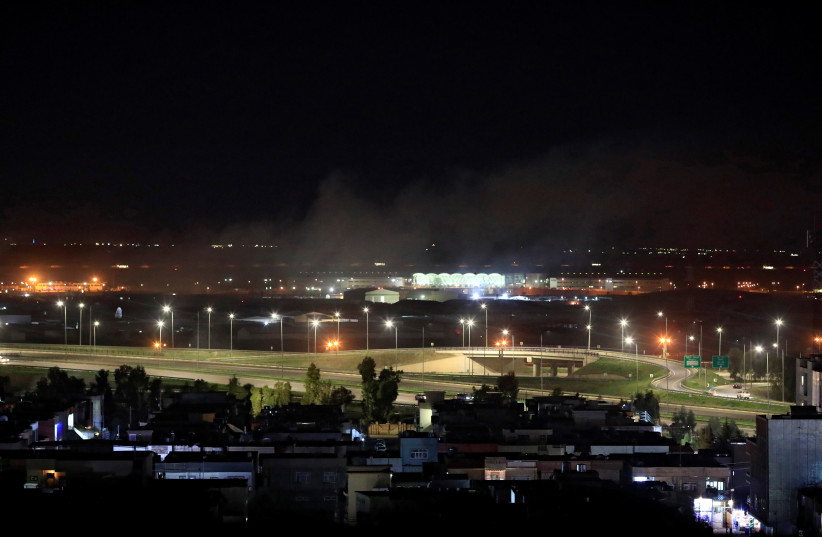Russian President Vladimir Putin can bomb cities in Ukraine with impunity because he knows that the US is not going to put “boots on the ground” to stop them.
Sanctions, yes. Troops, no. US President Joe Biden has said as much several times since the Russian invasion began on February 24.
The world, including Iran, is watching.
On Sunday morning 12 ballistic missiles were fired -- apparently from Iran -- toward the massive new US consulate being constructed in Erbil, in Kurdistan northern Iraq. The Iranian Revolutionary Guards Corp took credit, saying they were retaliation for the killing of two IRGC officers in Syria during an attack last week attributed to Israel. Iranian PressTV said the missiles hit “Mossad bases in Erbil.”
If the US is not responding as Putin devastated Ukraine, then what are the chances of it responding to an attack in northern Iraq that did not kill anyone, and “only” left two people lightly injured.

But this is a test.
Iran is furious and frustrated that the nuclear deal it has been negotiating for the last 11 months has stalled just as it was about to be signed and would have lifted sanctions and provided Tehran with a windfall of badly needed sanctions relief worth tens of billions of dollars. A furious and frustrated Iran is, as a result, lashing out.
The attack on Erbil was meant to send a message to the US and the West: “Ukraine is not your only headache, remember us. Remember us, and complete the new nuclear deal. Otherwise, we can cause trouble.”
In other words, Iran is falling back on its time-tested modus operandi: when all else fails, sow chaos.
Ironic it is that Russia -- looking for guarantees from the US that the newly clamped sanctions on Russia won't apply to their dealings with Iran, guarantees the US will not supply --- is holding up the agreement. The Iranians badly want the deal, the US is very keen on signing, but now Russian demands -- born of its invasion of Ukraine --is what is holding it up.
And what is Iran going to do against Russia for holding up the deal? Absolutely nothing, afraid of the consequences that could trigger. But to act against the US -- using Israel as an excuse -- is far less risky.
While the US may not respond militarily to this most recent Iranian provocation, that does not mean it will not have some ripple effect.
US Democratic congresswoman Elaine Luria, already very skeptical of the emerging deal, tweeted on Sunday that she is continuing to monitor reports of an attack on the consulate in Erbil.
“If reports are accurate, the Biden Administration must withdraw its negotiations with Iran. We cannot re-enter a failed JCPOA [the Iranian nuclear agreement formally known as the Joint Comprehensive Plan of Action to further empower Iran and threaten global security.”
Luria put her finger on the problem: If this is how Iran behaves in the region now, imagine what they will do flush with billions of dollars in sanctions relief cash.
Even before the attack on Erbil, Luria spearheaded a bi-partisan letter of 21US House Representatives last week -- 12 Democrats and nine Republicans -- sent to Biden warning that they cannot support an agreement “along the lines being publicly discussed.”
“Without adequately addressing Iran's role as the world’s leading state-sponsor of terror -- which was noticeably absent from the 2015 JCPOA -- and simultaneously providing billions of dollars in sanction relief, the United States would be providing a clear path for Iranian proxies to continue funding terrorism,” the letter wrote.
The Erbil attack only strengthens their point.
Will this letter stop Biden from signing if the Russians remove their obstacle to the agreement? No. But it will provide the president with an additional headache when he wants to sell it to the American people.
But it is not only the congresswoman from Virginian noting that the Iranians will get the price of a nuclear accord without needing to moderate by an iota their malevolent behavior in the region. The Arab world is taking note as well.
But the way various Arab states are articulating their displeasure is not through polite letters to Biden, but rather by less than enthusiastic support of the US and the West in the Russia-Ukraine crisis.
For instance, Saudi Arabia has refused US requests to increase oil output to bring down prices that have risen dramatically since the outbreak of the war because of a gap in supplies from Russia. The UAE, meanwhile, has sent out mixed signals on the matter.
Why would these long-time US allies be acting in such a manner?
When it comes to Saudi Arabia, it has to do with a deep anger at the US for the way it has related to the country since the murder of Washington Post columnist Jamal Khashoggi in Turkey in 2018. Biden, on the campaign trail in 2020, pledged to make Saudi Arabia the “pariah state that they are they are.” Since taking office, he has refused to talk to Saudi Crown Prince Mohammed bin Salman. The Saudis are offended, and their response to the Russian-Ukraine crisis reflects that.
As for the other Gulf countries, foremost the UAE, they are annoyed at the US and Europe for pushing the nuclear deal through, though they have been far less vocal in their opposition to the deal than Israel. A lack of enthusiastic support now for the US and Europe is one way of demonstrating their disapproval.
For months the UAE and Saudi Arabia have been targeted by drones and rockets and missiles delivered by Iran's Houthi proxies in Yemen. The concern in the Gulf is that an agreement now with Iran -- and an infusion of sanctions relief cash -- will just make more of that possible. The Erbil ballistic missile attack is a reminder that these concerns are far from being the product of paranoid minds.
